- Home
- Margaret Brownley
The Outlaw's Daughter Page 2
The Outlaw's Daughter Read online
Page 2
Matt’s eyebrows shot up. “There’s a statue of Blackwell?” From what he’d heard and observed, the town was still dealing with the economic problems caused by the drought. A statue seemed like a waste.
“Why didn’t they just give the money to his widow?” Matt asked. “Seems to me that would have been a better way to honor the man.” God knows, the woman looked like she could use some financial help.
The bartender shrugged and set the can down. “Well, it’s like this. Haywire is the only town that don’t have whatcha call braggin’ rights. Dallas has its Armadillo Days and San Antonio has the Alamo. Now we got our very own hero.”
Matt scratched his temple. “Where is this statue?”
“In the town square. They’re gonna…whatcha-call-it on Saturday?” Droopy’s forehead creased as he searched for the right word. “Dedicate it. That’s it! If you wanna be a hero, you best know how to die.” He laughed at his own joke.
Matt didn’t know what to think. When he set out to track down Blackwell, he’d been so certain of the man’s guilt. He hadn’t expected to find the man dead. Nor did he think to meet up with the likes of his widow. And he sure in blazes didn’t expect Blackwell to be a hero, let alone the town idol.
His job had just gotten a whole lot tougher, that was for certain and sure. Thanking the bartender, Matt left the saloon and rode his horse slowly from one end of town to the other. That was no easy task, as the town had more twists and turns than a scared rattler.
Still it was just as the bartender had said. If naming the school after the man wasn’t enough, large printed signs posted on lampposts proposed changing the name of the town from Haywire to Blackwell. There were almost as many signs for Blackwell as there were left over from the town’s recent election for mayor.
Matt followed a series of winding dirt roads until he found the town square. Sure enough, a bronze statue of a man carrying a child rose from a pedestal at the center of the square. Dismounting, he walked up to the statue for a closer look. The larger-than-life image was surrounded by flowers and candles. Indeed, even as he stood in the square, a matronly woman laid a bouquet of wildflowers at the base of the statue.
“Excuse me, ma’am,” Matt said, doffing his hat. “Did you know him?”
The woman lifted a tortoiseshell lorgnette to her rheumy eyes. A straw bonnet framed a well-lined face, and her gray hair was pulled back into a severe bun.
“Know him? I’d say!” she said in a voice that crackled with age. “He saved my grandson from that awful fire. He was a wonderful, wonderful man,” she exclaimed with great reverence, and her stacked chins wobbled in agreement. She lowered the lorgnette and gazed at the statue as if witnessing a miracle. “Too bad he married that woman.”
Matt frowned. “You have something against Mrs. Blackwell?”
A look of alarm crossed the woman’s face. “Oh, don’t get me wrong. That dear man just deserved…better.”
The way she’d said it made Matt wonder if she would have deemed any woman good enough for the town hero.
She lowered her voice. “I’m not one to gossip, mind you. But it’s the truth.” Making it clear she intended to say no more about Blackwell’s widow, she reiterated her high opinion of the statue’s subject and then walked away as quickly as her old bones allowed.
The woman wasn’t alone in her assessment of Neal Blackwell. Everywhere Matt went, it was the same story. Saint Blackwell did no wrong, and God help the man who said he did.
* * *
Ellie-May stood in the tall grass scanning the arid land that made up her farm. It was a small farm by local standards and barely produced enough to feed and clothe herself and two children.
It wasn’t much, but it was hers. All hers. The good Lord willing, the drought would soon be over, and the land would once again flourish. The clear-blue sky and hot, blazing sun suggested it wouldn’t be anytime soon. But for now, the ongoing drought was the least of her worries.
She had other things on her mind. Other things meaning a certain Texas Ranger. Why his visit upset her so, she couldn’t say. The Ranger was mistaken. Neal had known nothing about a stage robbery. She’d stake her life on it.
Placing her hands at her waist, she scanned the distance with narrowed eyes. Where was Anvil? Maybe he’d heard something in town that would explain the Ranger’s visit.
She hadn’t seen her farmhand since early morning, and she couldn’t help but worry about him. Lately, it seemed that he’d aged overnight. His step was slower and his back bent as he walked.
It had been a cold winter, and that seemed to have taken a toll on him. The barn loft couldn’t have been that warm, though he never complained and had steadfastly refused to sleep in the house. Said it wouldn’t be proper for a man to share the same roof with a widow-woman.
His concern for her and her children never failed to warm her heart. What a fine pickle she’d be in without him! Anvil was a slow worker, but he got the job done. Eventually.
But what he lacked in speed, he made up for in other ways. For one, he was willing to work for bread and bunk and enough money to support his Saturday-night whiskey habit. Not many men were willing to work for so little.
Sighing, she tramped through the tall grass until she spotted him propped up against the trunk of a sycamore tree, his felt hat covering his face.
While she debated whether to wake him or let him sleep, he pulled his hat away from his face and pried his eyes open as if he’d sensed her presence. He stared at her for a moment before struggling to his feet.
“I was just resting my ole bones for a minute, Miss Ellie-May.”
Though she had asked him to just use her Christian name, he’d insisted upon addressing her as Miss. He said that a fine lady like her should be spoken to properly, and that had made her laugh. No one had ever before called her a lady, fine or otherwise.
Anvil bent to pick his felt hat off the ground, one hand on the small of his back. After brushing off the dirt, he slapped the hat on his head. “I was gittin’ ready to fix the fence.”
Now, as always, he looked so eager to please that she didn’t have the heart to make mention of the fact that he’d been doing a lot of that lately—resting. Sleeping.
He was more than her ranch hand. He’d been a good friend to her since her husband passed and was kind to her children. If it hadn’t been for him, last Christmas would have been a bleak one indeed. But he had taken it upon himself to make Lionel a wooden wagon and her daughter, Alicia, a doll cradle. For that alone, Ellie-May owed him her undying gratitude and loyalty.
“I just wanted to ask if you’d seen anyone snooping around,” she said.
Anvil thought for a moment. “Nope. Not since I caught that fella trying to sneak off with your chickens last month.” The creases in his forehead deepened. “Why?”
“This morning, I caught a Texas Ranger in the barn. He asked about Neal.”
Anvil’s bushy eyebrows shot up. “A Texas Ranger, eh?”
She nodded. “Said something about needing information on that stage robbery they had a while back.”
She remembered the robbery well. It was all anyone had talked about at the time. Senator Henry Miles had been one of the passengers, and him being robbed during his visit to Haywire had posed an embarrassment to the town.
“Pshaw.” Anvil scratched a whiskered cheek. “What makes him think Mr. Neal would know anythin’ ’bout that robbery?”
She drew in her breath. That very question had been all she could think about ever since her encounter with the Ranger. “I have no idea. Have you heard any gossip that might explain it?”
He shook his head. “Not a word. All I heard say is what a good man your husband was, and I know for a fact that’s the God-honest truth. He was the kindest man I ever had the pleasure of meetin’. If it weren’t for him, I’d still be sleepin’ by the railroad tracks.”
<
br /> She watched Anvil open his toolbox and pull out a hammer. What he’d said was no exaggeration. She’d never forget the day Neal had brought Anvil home. What a sorrowful bag of bones he had been! His smell alone had been enough to topple a cow. She’d objected to letting the man in the house, but Neal had insisted that Anvil had seen hard times and deserved a chance to get on his feet again.
Anvil’s actual name was Willie Williams, but Neal had renamed him Anvil. He’d said that any man who’d survived living by the railroad tracks had to be strong as steel, and the name Willie didn’t do him justice.
Ellie-May had been used to Neal bringing home strays in the early days of their marriage, but by the time Anvil had come along, things had changed. They had a young child to think about. Like a mother bear fighting to save her cub, she’d threatened to take the baby and leave if Neal insisted upon letting the man stay.
Neal being Neal expressed disappointment that she judged Anvil as harshly as the town had judged her. It was an underhanded way to win an argument, but she’d nonetheless given in, and she was glad that she had.
“No sirree,” Anvil said after hammering a rail onto a post. He spit out a yellow stream of tobacco, and it plopped on the ground. “They don’t make ’em like Mr. Neal anymore.”
“They sure don’t,” she said and after a moment added, “When you have a chance, the step on the front porch needs fixing.”
He nodded. “I’ll get to it soon as I can. And don’t you worry none, Miss Ellie-May. That Texas Ranger comes snoopin’ around again, he’ll have to deal with me.”
She smiled. Anvil meant well, but he would be no match for the tall, strapping Ranger. “Thank you.” Leaving Anvil to finish his task, she walked back to the house, mulling over their conversation.
How foolish of her to get all worked up over one lawman, but she couldn’t seem to help herself. As much as she hated to admit it, Neal had had a quiet, dark side he’d always done his best to keep hidden from view.
She couldn’t recall the number of times during the early days of their marriage that she’d woken in the middle of the night to find his side of the bed empty. Invariably, she’d find him pacing the floor or out on the porch staring at the dark of night.
At other times, she’d catch him gazing into space as if he were a hundred miles away.
But then he’d turn around and do something nice for her. Something nice for the children. For the town.
After one such episode, he whitewashed the church all the way to the steeple. Another time, he worked twenty-four hours straight to clean up his neighbors’ yards after a tornado had ripped through town.
One night, he’d finally told her what haunted him; he’d accidentally shot and killed his best friend. He’d only been ten at the time and his friend eleven, but the pain and grief had never left him.
Helping others had been part of Neal’s atonement. As much as Ellie-May hated to think it, she often wondered if marrying an outlaw’s daughter had been his penance as well.
Dying to save all those children had been his final payment to society, though she doubted Neal would agree. He didn’t have it in him to forgive himself.
He had even apologized to her for not being a better provider and promised that things would get better in the future. Had he lived, she had no doubt he would have found a way to fulfill that promise. That was the kind of man he was.
Shaking away her thoughts, she picked up her skirt and quickened her pace. There was no denying that Neal was a good man. A good husband. A good father. A hero. And that was what she needed to remember. That was what everyone needed to remember.
For the sake of her children.
3
Sheriff Keeler leaned back in his chair, hands clasped behind his head, and stared over his propped feet at Matt. “Let me get this straight,” he drawled, and his mustache twitched. “You think Blackwell is responsible for that holdup?”
Matt lifted his gaze to the ceiling. It was hard to hear over the noise coming from upstairs. Prisoners confined to the second-floor cells were pounding the floor, and the hanging gaslight over his head swung back and forth like the pendulum of a clock.
“That’s yet to be determined,” Matt said, raising his voice to be heard over the racket. “It’s possible.”
“Quiet!” the sheriff yelled, and the stomping stopped. He made a face. “Wasn’t that long ago that prisoners took their punishment without complaint. Now there’s no pleasing them. Would you believe they’re demanding steak instead of bread and water?”
Ignoring the question, Matt leaned forward. “About Blackwell…”
Sheriff Keeler dropped his feet to the floor and leaned forward. Hands clasped together, he propped his elbows on the desk. “What proof do you have that makes you think Blackwell was involved?”
That was the problem. Matt didn’t have any real proof. At least none that would stand up in court. He nonetheless reached into his vest pocket and pulled out the stub of a train ticket, found in a Pinkerton file. The agency had never officially been on the case, but one of the detectives in town at the time had checked out the crime scene.
“This was found where the robbery took place,” Matt said, holding up the ticket. “It was purchased here in Haywire.”
The sheriff’s eyebrows rose. “That’s it? That’s all you have?”
“According to the records, only two tickets were purchased that day at the Haywire station. And the station master distinctly remembers selling one of those tickets to a man named Harvey Wells.”
The sheriff’s gaze sharpened. “Wells?”
Matt nodded. “He’s a local farmer and inventor.”
“I know who he is.” The sheriff pondered this latest information for a moment. “So why isn’t he under suspicion?”
“Wells got off the train in Austin to visit his ailing grandfather and didn’t return to Haywire until a week after the holdup. His story checks out.”
The sheriff scoffed. “How would Hawkins remember who he’d sold tickets to? It was more than a year ago.”
“Actually, he only remembered the one,” Matt said. “That’s because it was Hawkins’s first day on the job, and he distinctly remembers Wells trying to sell him a mechanical ticket dispenser he’d invented. It was Wells who told me Blackwell boarded the train with him and planned to return to Haywire that same day. That puts him back in town at the time of the robbery.”
The sheriff pondered that information for a moment. “Okay, Blackwell was back in town. So what? That don’t make him a thief. He could have dropped that ticket or tossed it away. It could have blown to the robbery location for all we know.”
Matt stuck the stub back in his pocket. As far-fetched as the sheriff’s arguments seemed, they were precisely the same arguments a defense attorney would use in a court of law, and that was the problem.
“The ticket could also have been dropped by the thief at the time of the robbery,” Matt said. “Don’t you think it strange that there’s been no other local robberies since Blackwell passed? How do you explain that?”
The sheriff sat back and folded his hands across his chest. “I don’t know how to explain it. All I can tell you is that I knew Neal personally, and he wouldn’t hurt a fly. He sure in blazes wouldn’t rob anyone, let alone a stage.”
As if to agree, the pounding of feet began again. It was so loud this time that even the windows rattled.
“Quiet!” Keeler yelled, and when that failed to gain results, he left his seat and grabbed a broom from the corner. Cursing beneath his breath, he banged the ceiling with the broom handle until peace had once again been restored.
Returning the broom to the corner, he sat. This time, he regarded Matt with a look of disdain. It was no secret that the sheriff resented having to deal with the Texas Rangers, and he wasn’t alone in that regard. Though one of the main responsibilities of the Rangers was
to render assistance to local lawmen, their help was often regarded as criticism or interference. For that reason, the Rangers were seldom appreciated or even wanted.
“It’s been a year since that robbery,” the sheriff said. “Why all the interest now?”
“The senator’s been pushing it. He still has hopes of recovering his heirloom ring stolen during the holdup.”
The sheriff shook his head. “Not much chance of that. The thief probably sold it.”
“Maybe, but the senator happens to be a friend of my captain and asked the Rangers to step in.” Matt regarded his current assignment as a demotion for failing to arrest his outlaw brother when he’d had the chance. No one had called it a demotion, of course, but he’d been with the Rangers long enough to know that messing up was not an option. By letting his brother get away, Matt had messed up big time.
The pounding started up again, forcing the sheriff to raise his voice to be heard. “If you think Blackwell was involved, you’re dead wrong.”
“I take it you knew him well,” Matt said, lifting his voice.
“Yes, and you’d be hard-bent to find a better man.” The sheriff’s next words were drowned out by the prisoners’ noise.
Matt cupped his ear. “What?”
“His widow. Have you met her?”
“Yeah,” Matt said, dropping his hand to his side. “I met her.” No sooner were the words out of Matt’s mouth than a vision of a blue-eyed woman holding a shotgun sprang to mind. A dainty thing she was, size-wise, standing little more than five feet tall. Despite her small size, she hadn’t seemed at all intimidated by his six-foot frame or even his status.
That alone had been surprising. He’d seen burly men fold when confronted by a Texas Ranger, but not Blackwell’s widow. Instead, she’d looked ready to fight him tooth and nail to protect her husband’s honor.
The sheriff left his chair again and reached for the broom. After restoring order for a third time, he stood holding the broom, ready to wield it again if necessary. “If you met Ellie-May Blackwell, then you know she’s as poor as a church mouse. If Neal robbed that stage, then what in blazes did he do with the loot?”

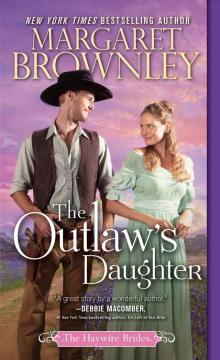 The Outlaw's Daughter
The Outlaw's Daughter Waiting for Morning (The Brides Of Last Chance Ranch Series)
Waiting for Morning (The Brides Of Last Chance Ranch Series) Do You Hear What I Hear?
Do You Hear What I Hear? The 12 Brides of Summer Novella Collection #3
The 12 Brides of Summer Novella Collection #3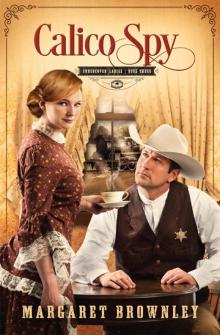 Calico Spy
Calico Spy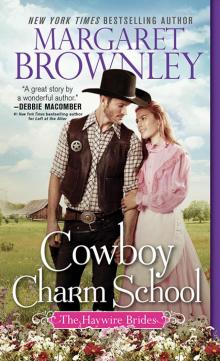 Cowboy Charm School
Cowboy Charm School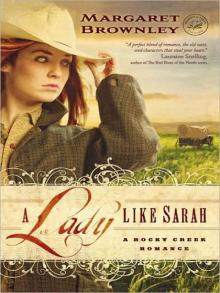 A Lady Like Sarah
A Lady Like Sarah A Match Made in Texas
A Match Made in Texas Left at the Altar
Left at the Altar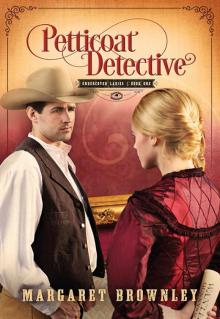 Petticoat Detective
Petticoat Detective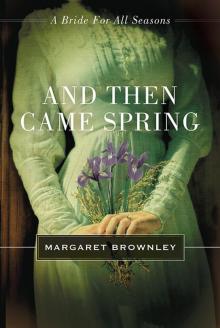 And Then Came Spring
And Then Came Spring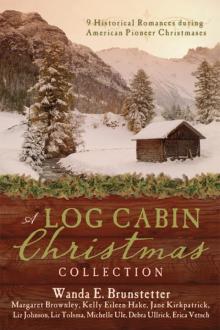 Log Cabin Christmas
Log Cabin Christmas Four Weddings and a Kiss
Four Weddings and a Kiss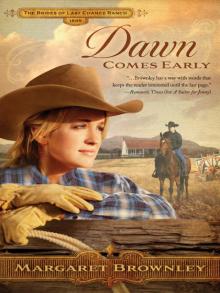 Dawn Comes Early
Dawn Comes Early